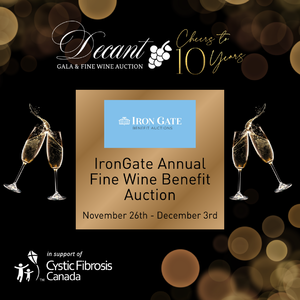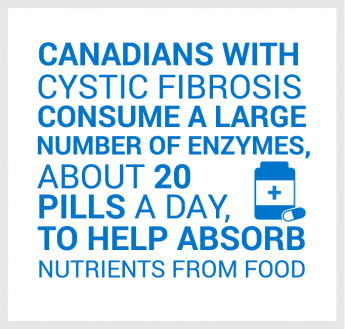Dr. Christine Bear is a researcher at the Hospital for Sick Children (SickKids) in Toronto, who recently received funding from Cystic Fibrosis Canada to pursue her research study, Multi-site collaboration to validate use of patient-derived nasal cultures for expanding access to CFTR modulators. Dr. Bear hopes to find a way that Trikafta can be used for CF patients with mutations other than the most common F508del mutation. Through the use of nasal cells, there could be evidence that Trikafta can improve lung health for those who have been denied access due to their rare mutations.
Though the study is still in the works, Dr. Bear has already received two awards for this tremendous project. She received the Cathleen Morrison Research Impact Award, meaning her project was ranked the highest by the community members who volunteered their time alongside scientific reviewers to review proposals submitted to Cystic Fibrosis Canada as part of the granting process. Dr. Bear was also awarded the Senior Scientist Research Award, which recognizes the contributions of an established CF investigator with an outstanding record of accomplishment in the cystic fibrosis field over many years, and whose application to the current Cystic Fibrosis Canada Grants & Awards competition ranks very highly.
Cystic Fibrosis Canada is proudly able to support this research thanks to a generous grant for basic science research from the Sarah Gordon Sutherland Memorial Fund. Our sincere thanks to the Gordon family for making this work possible.
Register to join our webinar on September 12 at 7pm as Dr. Bear will discusses this important research.
Read more about Dr. Christine Bear’s contribution to CF research below.
How did you become involved in CF research and what do you enjoy most about your work?
I have been involved in cystic fibrosis research for many years. I was first recruited to SickKids around the time that the CFTR gene was being discovered to look at the activity of the channels in cells that allow for the passage of chloride ions. And of course, I was so excited to be able to join SickKids just at the time of this incredible discovery.
CF research has been a long and exciting story. After the gene was discovered, it was incredible to be part of learning what the protein did and how mutations affected it. That work led to the discovery of therapies that are now rolling out in the community. It is inspiring to see this happening. There are also moments of frustration, because we know that not everybody has access to these therapies. This is why we are focusing on improving access to therapies for everybody.
Can you tell us a bit about your study, Multi-site collaboration to validate use of patient-derived nasal cultures for expanding access to CFTR modulators?
Using the nasal cells collected from individuals in Canada with cystic fibrosis through the Cystic Fibrosis Individualized Therapy (CFIT) program, we are testing for responsiveness to Trikafta in the lab. We are testing the idea that the response of someone’s nasal cells in the lab will be predictive of how the individual will respond to the drug clinically, so we should have a good idea of which individuals and which CFTR mutations will benefit from Trikafta, outside of the known F508del mutation. We still have a lot of work to do. We are in the process of comparing responses of nasal cells with the F508del mutation in the lab and the responses of those same individuals who donated the cells when starting on Trikafta. If we can prove the correlation in this group, this will suggest that for rare mutations, the nasal cell response in the lab will help show which patients may benefit from Trikafta clinically. We are encouraged by what we are seeing so far.
Who are the people that don’t have access to Trikafta in Canada right now?
Currently, those with the genotype F508del are approved to access Trikafta. It was incredible to see the recent news that Ontario will be reimbursing its cost. However, some people with CF because they have other mutations still lack targeted and effective therapies.
Based on what we see in nasal cell studies, we think that there are some people who don’t currently qualify for Trikafta, but might be responsive. With our new grant, we are generating the evidence needed to support the use of Trikafta in more people with CF.
What will your research mean for people living with CF?
If we do find that Trikafta will work in some people without the F508-del mutation, it is going to mean a lot of hard work for all of us to advocate for access. If the assay shows a response in patient cells, we will need to persuade Health Canada and eventually provincial reimbursement mechanisms to approve the drug for these other mutations. Ultimately, long term it could mean that more Canadians who live with cystic fibrosis will have access to a therapy like Trikafta.
What is your hope for the potential of your research?
In the shorter term, my hope -- and I will be truly committed to this -- is to contribute to improved access for therapies. We will beat the drums and do whatever we can, whatever Cystic Fibrosis Canada feels we can do to help -- we are there. In the longer term, we will build the research capacity here to bring about innovative new therapies. CF is a prime candidate to benefit from new technological advances that are starting to emerge in other disease entities.
You were recently awarded the Cathleen Morrison Research Impact Award, which means your research ranked highest among our community reviewers. What does this award mean to you?
I was just so grateful and humble when I heard about this. It means the most to me that the community recognizes the importance of this work. That the reviewers saw that and felt our commitment is just heartwarming.
I also know Cathleen Morrison well. Cathleen Morrison was one of the strongest advocates for CF research that I ever met. She was relentless. She was there when the gene was discovered, she was there for the early days of all of my research. I have a warm relationship with Cathleen, and that was another reason that I was just really overwhelmed and just so happy and grateful when I got that award.
“It is a great honour for me that the ‘Research Impact Award’ bearing my name is to be given to Dr. Christine Bear. Dr. Bear has committed her professional life to cystic fibrosis [CF] science, and she is a world leader in her profession,” said Cathleen Morrison, past CEO of Cystic Fibrosis Canada and the inspiration for this award. “Dr. Bear’s work came to public attention in the early 1990s when, with Dr. Jack Riordan, she closed the gap between knowledge of the gene responsible for cystic fibrosis and what was thought to be the basic defect in the disease. She demonstrated in vitro for the very first time that the protein produced by the gene functions, in epithelial cells, is a channel which transports chloride. Now a senior scientist and Co-Director of the CF Centre at Toronto’s SickKids Hospital, Dr. Bear is working at the interface between basic and clinical research to develop strategies for precisely targeted CF therapies."
You were also the Senior Scientist Research Award Winner. This award recognizes the contributions of an established CF investigator with an outstanding record of accomplishment in the cystic fibrosis field over many years, and whose application to the current Cystic Fibrosis Canada Grants & Awards competition ranks very highly. What are your thoughts on this award?
It takes my breath away. To be able to contribute to this field has been a major focus for all of my career, and to have it recognized in this way is extremely gratifying. I just hope that we can continue to have the impact that I think we can. We are well positioned to help in improving access to Trikafta and also well positioned for a lot of the stem cell research we are doing now to help in discovery for some of the very rare mutations for which there are no therapies right now. I feel grateful, humbled, and I feel a renewed sense of responsibility with these awards.


.png)

.jpg)
